Meta develops gloves that give you a tactile experience in virtual space

Inside Reality Labs Research: Bringing Touch to the Virtual World | Meta
https://about.fb.com/news/2021/11/reality-labs-haptic-gloves-research/
Inside Reality Labs Research: Meet the team that's working to bring touch to the digital world
https://tech.fb.com/inside-reality-labs-meet-the-team-thats-bringing-touch-to-the-digital-world/
Meta haptic glove prototype lets you feel VR objects using air pockets --The Verge
https://www.theverge.com/2021/11/16/22782860/meta-facebook-reality-labs-soft-robotics-haptic-glove-prototype
Facebook --Haptic Glove Research
This is a 'tactile experience glove' developed by Reality Labs with multiple cables and protrusions attached.
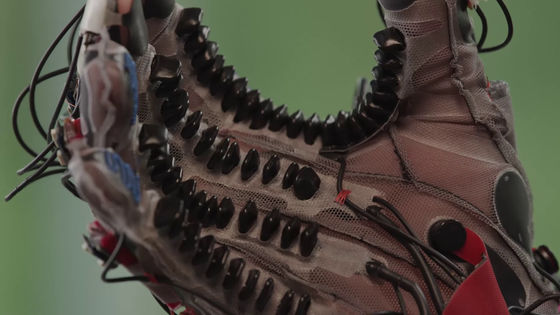
There is already a mechanism to display the user's limbs in VR / AR, and you can push, pull, and grab things, but unlike in reality, there is no 'feeling of touching'. It is this 'tactile experience glove' that overcomes this.
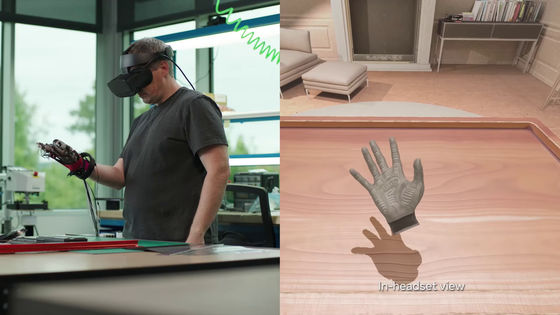
For example, if you hold your hand in reality, you can also hold your fist in virtual space. You can reproduce the shape by attaching a sensor to your fingertips and capturing.
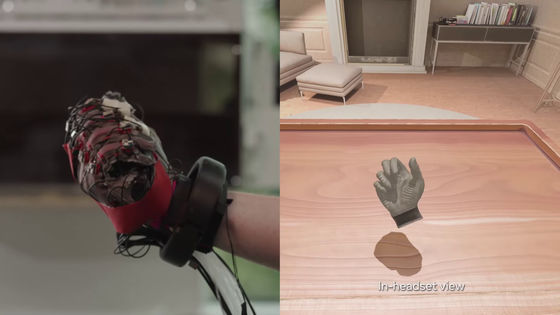
However, with this glove, you can feel its shape when you pick up the building blocks in the virtual space.
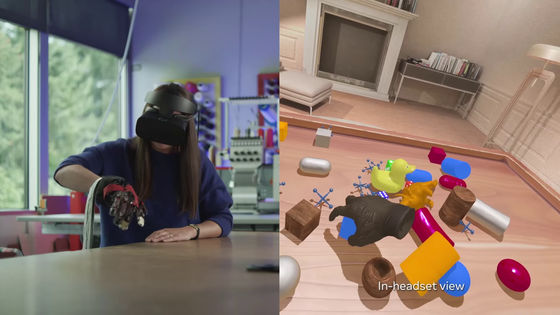
Shake hands in virtual space. You can feel the palm of your hand touching and the other person's hand holding your hand, just like a real handshake.
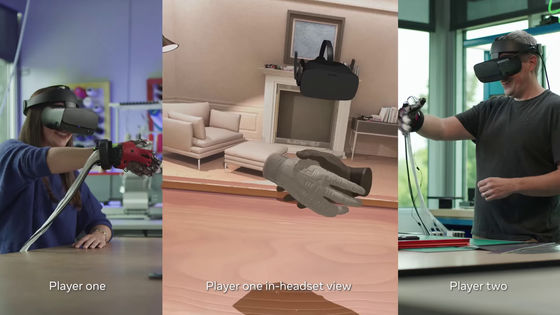
Even when playing Jenga in virtual space, you will be able to feel the lightness of 'It's okay to pull out here' with your fingertips.
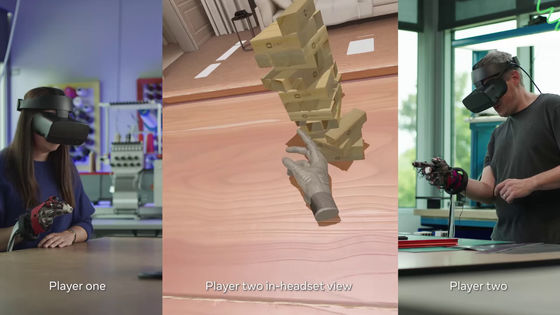
According to Meta, development began seven years ago. Research director Sean Keller started alone, and now it is a department where hundreds of world-class experts gather.
Mr. Keller aimed for a soft and lightweight tactile glove that can interact with VR and AR. Factors required for commercial success include 'stylish appearance,' 'comfort,' 'affordability,' 'durability,' and 'customizability.' increase. It was also required to be paired with a VR headset to provide an immersive experience in the Metaverse, and ultimately to work with AR glasses.
Hundreds of actuators are required to convey that you are touching a virtual object to provide tactile sensation, but existing mechanical actuators generate a lot of heat, making it difficult to wear gloves comfortably all day long. was. In addition, the actuators were large, hard, expensive, and consumed a lot of electricity. For this reason, the team focused on pneumatic actuators and electrically active actuators used in artificial limbs, and built the world's first high-speed microfluidic processor for actuator control.
Even if there is an actuator, there must be advanced hand tracking technology that properly sends information on virtual objects to the computer, so we have also developed software that acquires the state and interaction of the virtual world and renders the corresponding sensation on the actuator. In addition, detailed experiments have been repeated to adjust the reaction obtained from the actuator so that it is equivalent to when the actual material is touched.
And for comfortable gloves, we have created new materials and manufacturing technology.
Meta says that while the technology to provide a reliable tactile experience in VR and AR does not yet exist, Reality Lab will continue to make progress in making tactile gloves a reality.
Related Posts:







